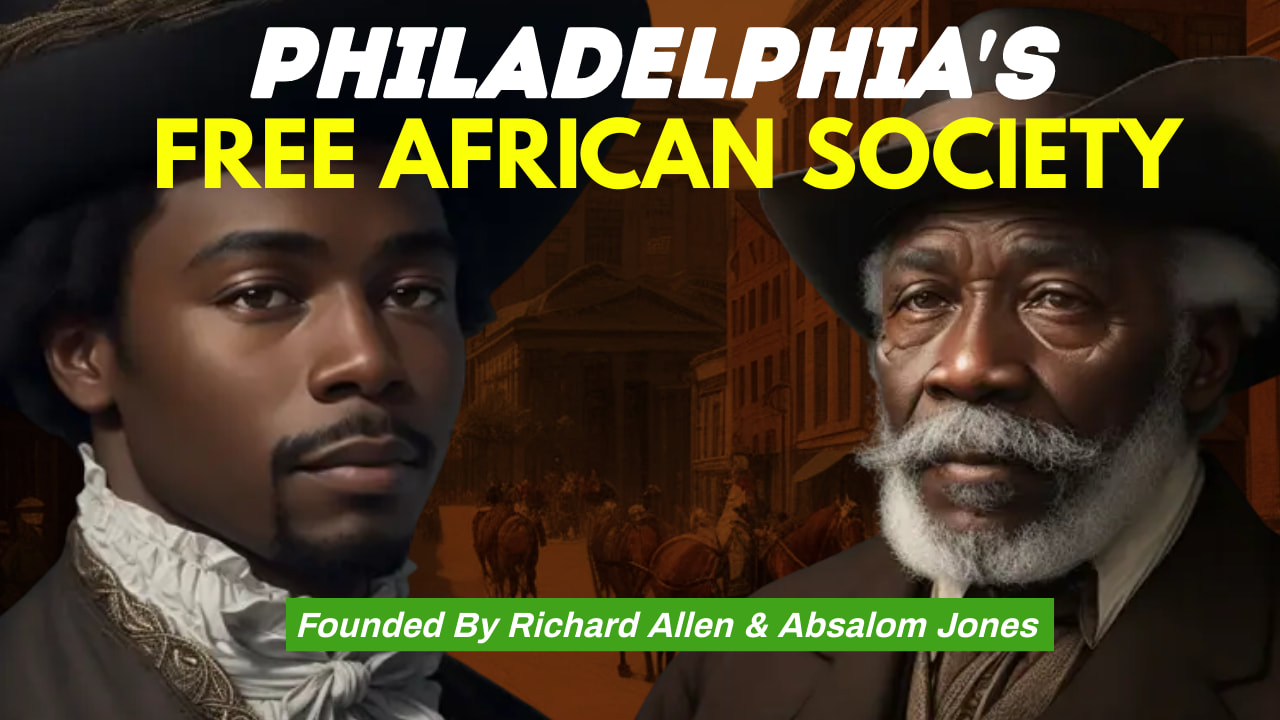|
The 1787 Free African Society of Philadelphia, often referred to as FAS, is an essential institution in the history of African Americans and the early history of the United States. Founded in a pivotal era marked by the American Revolution and debates over slavery, the Free African Society served as a pioneering example of self-help and community organization within the free Black population of Philadelphia. The American Revolution fought between 1775 and 1783, ignited debates about liberty, equality, and the rights of individuals. The Revolution's rhetoric inspired many enslaved and free Black people to question their own status and advocate for their rights as well. By the late 18th century, Philadelphia had a substantial population of free Black people. Many had gained their freedom through manumission, military service, or other means. However, their freedom was far from secure, as racial prejudice persisted and racist laws were passed. The Free African Society was founded in April 1787 by Richard Allen and Absalom Jones, both prominent African-American religious leaders in Philadelphia. Richard Allen later founded the African Methodist Episcopal (AME) Church, and Absalom Jones established the African Episcopal Church of St. Thomas. The primary objective of the Free African Society was to provide mutual aid and support to the free Black population in Philadelphia. This support encompassed various aspects of life, including education, employment, healthcare, and religious life. The Free African Society collected funds from its members and provided financial assistance to those in need. This support included help with housing, clothing, food, and medical care. Recognizing the importance of education, the Free African Society established schools for Black children, focusing on teaching reading, writing, and arithmetic. Education was viewed as a means to uplift the Black community and promote self-reliance. Both Richard Allen and Absalom Jones were ordained ministers. They played pivotal roles in fostering a solid religious community among Black Philadelphians. In 1794, Jones and Allen founded the Free African Church of St. Thomas, which later became the African Episcopal Church of St. Thomas, a prominent African-American church in Philadelphia. The Free African Society's emphasis on mutual aid, education, and religious life contributed significantly to the self-help and community-building efforts among free Black individuals in Philadelphia. It provided a model for future African-American organizations and churches. Richard Allen's involvement in the Free African Society laid the groundwork for the establishment of the African Methodist Episcopal (AME) Church. The AME Church later became one of the most influential African-American denominations in the United States. Members of the Free African Society, including Absalom Jones and Richard Allen, continued to advocate for the rights of Black Americans. They were vocal in their opposition to racial discrimination and segregation, contributing to the broader struggle for civil rights. The 1787 Free African Society of Philadelphia played a pivotal role in the early history of African Americans, promoting self-help, mutual aid, education, and religious life within the free Black population. Founded by Richard Allen and Absalom Jones during a transformative period in American history, the society left a lasting legacy that extended beyond Philadelphia. Its impact can be seen in the African Methodist Episcopal Church and the ongoing fight for civil rights in the United States. To Richard Allen, Absalom Jones, and blacks of the Free African Society, we proudly stand on your shoulders.
0 Comments
Leave a Reply. |
Details
Categories
All
Click Here to join our mailing list
|
Contact Us: |
Connect With Us |
Site powered by PIT Web Design


 RSS Feed
RSS Feed



